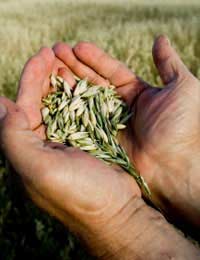Why Organic Food Costs More

Organic food does often cost more than regular food that is produced non-organically.Sometimes it can cost up to 50% more in the case of early summer fruit and vegetables, sometimes it only costs a few pence more, depending largely on the seller.The reasons for this price difference are varied. It is mainly to do with production costs, but also because many food suppliers, namely supermarkets, actually hide the real cost of food by bringing in to the country cheaper and cheaper food imports.
While shoppers at the tills are glad to see the savings they have gained on imported non-organic foods, and can be horrified to see that the organic food in their basket, which may even have been grown in their local area, is more expensive, the discrepancy is made up by supermarkets disguising the real cost of food, which is ultimately, not such a cheap commodity as many shoppers believe it to be.
Agri-Business and Cut-Price Food
The more intensive agriculture and the food industry becomes, the cheaper the food it produces can be. With modern transportation and innovations like canning and flash freezing, food can either get from the field to the consumer very quickly, or it can be stored. However, as mechanisation has improved within this industry, humans’ role in this process can diminish. Often workers in this industry are paid very little.In the organic farming process, it is more human-intensive, and there are fair wages set as standard. More land must be given to crops grown organically, and the cost of using more land (and less machinery), must also be factored in to the eventual cost of the product.
Farmers who farm organically are realising the power of their product, and starting to demand a fair price from the purchasers and suppliers, which can lead to a higher price on organic food in the shops, as sellers pass this cost on to the shopper.
Eating Healthily Costs More
The more organic food that is produced and bought within the UK, the more the cost of it will come down. If cheap imports are reduced there will be a price stabilisation of food cost, and the shopping public will start to see the real cost of agriculture.It is unfortunately true though, that to eat healthily in the western, developed world, here in the UK, the consumer must spend more money on organic food than on non-organic food.Ways to reduce spending might include:
- Buying a large and regular supply as a community, perhaps getting a group of friends or neighbours to order together, and buying in bulk from a local health food store or a specialist organic supplier;
- Buying a weekly or monthly vegetable box from a local organic farmer;
- Growing some organic food yourself – using window boxes if there is limited space, or joining up with a local allotment scheme;
- Befriending a local organic farmer (meet them at your local farmer's market), and offering some regular work hours on the farm in exchange for organic vegetables.


Re: The British Film Industry
To whom it may concern I am 49 years old with the white hair , I was a investigative journalist in Afghanistan, and live in Belgium…
Re: Traditional British Beverages
Wonderful knowledge. This helped me so much for my A-levels absolutely marvelous! thank you.
Re: Great British Landmarks
@mae. Great to hear the site has been useful for you. Enjoy learning about Great Britain.
Re: Great British Landmarks
I am only in year 6 and we are learning about great Britain!
Re: Best British Brands
Unless they manufacture in the UK they have no right to call themselves a British Brand and I will do all I can to avoid purchasing any of…
Re: Famous British Actors
In the 1980's (I think) I attended a concert at the Westbury Music Fair on Long Island. He was a singer/actor with a British accent and he…
Re: Traditional British Beverages
@ceggy91. That's great thanks for letting us know.
Re: Traditional British Beverages
I LOVE this page. It helped me with my family heritage project.
Re: British Writing Awards
I'm from northeastern part of India,my english is so horrible.plz give me sm helpful tips to master english in best possible way..????
Re: How To Make Chelsea Buns
thank you for the help on making chelsea buns :D